Joyce Fegan: Why taking paternity leave is an act of rebellion

We live in a working world that was designed decades ago. It was designed around a man who wouldn’t get pregnant, needing neither leave for early pregnancy loss or maternity cover, and it was designed without family in mind, full stop.















